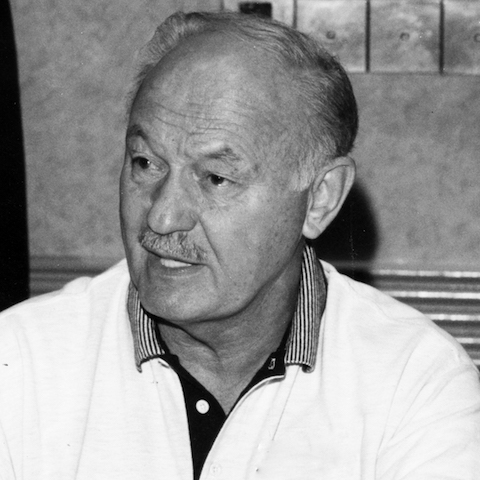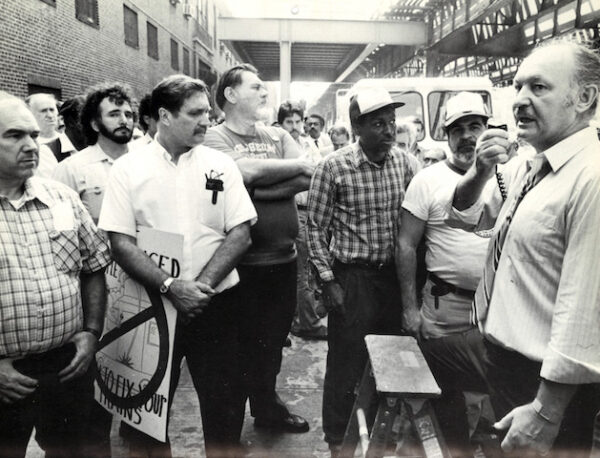New York, NY – Harold “Sonny” Hall, former president of TWU Local 100 and the International Union passed away in his sleep in hospice care on Jan. 13. He was 89.
Hall was born in the Bronx on January 30, 1932. His father, also named Harold, was a bus operator at the 10th Street Depot, now Tuskagee Airmen Depot.

Hall served as an Army MP at a nuclear facility in Albuquerque, New Mexico and then began as a bus cleaner at the 146th Street Depot, now Mother Clara Hale Depot, in 1953. He almost lost his job due to poor attendance, at a time when the union was fighting for the five-day, 40-hour work week in the private bus industry. He said union organizer Frank Gavin saved his job by fighting for him at a hearing. Gavin, at the same time warned him about his behavior, and that put Sonny on the right track.
TWU International President John Samuelsen said, “It’s a sad day for the TWU. I knew Sonny as a young trackworker, as Local 100 president and now as international president. Sonny was one of the last direct links to Mike Quill and the founders of the TWU. He was an anchor for the TWU and his departure will be deeply felt.”
Hall began attending union meetings to “find out what was going on,” and his record of attendance turned out to be his springboard into the union. It was his good record of attending those meetings that finally got him move involved. “Our depot chair at 146th Street was retiring, and the person who was running for the job, Jimmy Hood, needed someone else on his slate. I was one of the few people who had the required number of meetings to qualify, so Jimmy asked me if I would run with him. That’s how it all started,” Sonny recalled before his passing.
Sonny served as vice chair at 146th Street beginning in 1964 with Hood as chair. “We must have done something right for the members, because we kept getting elected,” he said.
During the citywide transit strike in 1966, Sonny was assigned to picket outside the old City jail where TWU International President Mike Quill and other union leaders were being held after their arrest for defying a court order. “I was at the press conference where Mike Quill famously told the judge to ‘drop dead in his black robes,” Sonny recalled.
He continued his climb up the ladder. When the union went out on its second cit wide strike in 1980, Sonny had risen to vice president for MaBSTOA Division 1. “I told the reporters that the Executive Board was split and we were really going to strike. They thought we were crying wolf, but we weren’t,” he said. As Vice President, Sonny was responsible for all contracts for the private bus companies. He oversaw an 11-week strike against New York Bus Service in 1984.
In 1985, the Executive Board thrust Sonny into the role of president when then Local 100 President John E. Lawe moved up to TWU international president after the unexpected death of William G. Lindner.
For the next nine years, he guided Local 100 through three major contracts with the MTA and numerous other agreements with the private bus lines.
As president, he also instituted the bargaining unit protection program to preserve the union’s traditional work, and bring back in-house some of the contractor’s work. He beefed up the union’s political department in Albany as well.
In 1993, Sonny was elected TWU international president, a position he held until his retirement in 2004. During this time, he broadened TWU’s brand nationally, and launched an aggressive buildup of the union’s political operation on Capitol Hill.
In 1998, he was elected President of the 2-million member AFL-CIO Transportation Trades Department, where he brought all elements of transportation labor together into its most unified political force in decades. His influence was felt in Congress, the federal agencies overseeing transportation and the White House.
In 1991, he succeeded in launching Local 100’s Union Assistance Program (UAP), which he personally negotiated with then Governor Mario Cuomo after the tragic Union Square crash on the 4 line that claimed five lives. The train operator was arrested for being intoxicated and spent five years in jail.

Jim Gannon, director of communications for Local 100, said, “I tell you what Sonny thought was his greatest win, was the establishment of the Union Assistance Program…it’s for those with alcohol, drug abuse problems…if you volunteered to come forward it was totally confidential and non-disciplinary. And it’s still there today from when Sonny formed it back in the early 90’s. It’s going strong. It’s helped untold thousands of members. Not just drug and alcohol, but also depression issues, any kind of personal crises issues. The thing about Sonny was he helped so many people, quietly, all kinds of people – members with personal problems, issues with management, with family concerns, Sonny just bent over backwards to help people. [He] didn’t want any accolades for it, just did it. He was a totally committed person. Not just on a union scale. Felt for people. He was just a great guy. And in his day, he carried a tremendous amount of weight. Politically speaking. In Albany, City Hall, and also, even in Washington, because he was also, he had been elected president of the Transportation Trades Department. Sonny was well-respected across the labor movement especially in transportation labor. He did it all for the greater good and he was a very humble guy. Never really looked for pats on the back.”
Mike Tutrone, director of the TWU Local 100 Retirees Association, told LaborPress, “Sonny was on the job when I came on the job, he was already in the union, he was I believe a chairman or division chairman when I came on the job in 1973. He rose to the ranks of vice president shortly thereafter and I knew him, I worked on the periphery with him. We didn’t become friends until after he retired…when people retire they don’t realize they’re going to hit a wall because you just can’t do something for 30 or 40 years and then just walk away from it. It’s in your blood, you just can’t stop. When he retired I was still actively employed by the Transit Authority at the union. So, that was division chairman at the time. I was able to accommodate him…to allow him to continue in union business on the retiree side. When I ultimately retired, I came back to work for the union in the capacity of the TWU Local 100 Retiree Association and I brought him right in and he was very happy to be involved…he always made himself available…he had so many contacts throughout his active years in the union that he was able to open doors…to help retirees…he helped us with negotiations. [But] he was the type of guy that never looked at himself as more than an average Joe. That’s what he used to tell people all the time, ‘Hey, I’m nothing more than an average Joe doing my level best to do what I can to help people.’ And that’s what he did his entire life.”
Hall’s wife Maureen predeceased him. Survivors include nieces Patricia and Suzanne; daughter-in-law Shari, and granddaughters Skyler and Colby.



